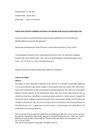 1 citations,
October 2000 in “Pediatrics in Review”
1 citations,
October 2000 in “Pediatrics in Review” The document says that hookworms are treated with mebendazole and stress-related hair loss usually gets better in 6 months, while other hair loss types have specific treatments.
 April 2018 in “Journal of Investigative Dermatology”
April 2018 in “Journal of Investigative Dermatology” Aging reduces skin cell renewal and defense against germs due to TGFbeta, but blocking TGFbeta could help restore these functions.
 27 citations,
May 2016 in “Dermatologic Surgery”
27 citations,
May 2016 in “Dermatologic Surgery” Male faces age with more wrinkles and hair loss, influenced by both body changes and environmental factors.
 24 citations,
July 2018 in “Stem cells”
24 citations,
July 2018 in “Stem cells” Runx1 controls fat-related genes important for normal and cancer cell growth, affecting skin and hair cell behavior.
 11 citations,
November 2009 in “Brazilian Journal of Medical and Biological Research”
11 citations,
November 2009 in “Brazilian Journal of Medical and Biological Research” Young C57BL/6 mice heal better than BALB/c mice, and older mice heal faster but regenerate worse.
 6 citations,
March 2014 in “Herba Polonica”
6 citations,
March 2014 in “Herba Polonica” Plant extracts may help treat hormone-related hair loss.
 January 2008 in “Annals of Nutrition and Metabolism”
January 2008 in “Annals of Nutrition and Metabolism” Parthenolide promotes hair growth in mice and may influence pathways related to male pattern baldness.
 31 citations,
September 2009 in “Natural Product Research”
31 citations,
September 2009 in “Natural Product Research” Citrullus colocynthis fruit extract may effectively treat testosterone-related hair loss, similar to finasteride.
 23 citations,
January 2010 in “Journal of Medical Primatology”
23 citations,
January 2010 in “Journal of Medical Primatology” Hair loss in Rhesus macaques may be caused by a skin allergy-related condition.
 6 citations,
May 2021 in “Clinical Chemistry and Laboratory Medicine”
6 citations,
May 2021 in “Clinical Chemistry and Laboratory Medicine” Different ACE2 gene versions may affect COVID-19 impact based on age and suggest some hair loss drugs could be potential treatments.
 11 citations,
January 2001 in “Cambridge University Press eBooks”
11 citations,
January 2001 in “Cambridge University Press eBooks” Androgens can cause hair growth in some areas but hair loss on the scalp.
 January 2007 in “Elsevier eBooks”
January 2007 in “Elsevier eBooks” Alopecia areata is a reversible, autoimmune-related hair loss that can have significant emotional impact and uncertain treatment effectiveness.
 98 citations,
October 2012 in “Dermatologic Clinics”
98 citations,
October 2012 in “Dermatologic Clinics” Eating the right nutrients can improve hair health, but taking extra supplements usually doesn't help unless you have a deficiency.
 17 citations,
November 2012 in “Maturitas”
17 citations,
November 2012 in “Maturitas” The conclusion is that proper evaluation and treatment of hair loss in midlife women is important, considering the emotional impact and potential for various treatments.
 9 citations,
July 2013 in “Experimental Dermatology”
9 citations,
July 2013 in “Experimental Dermatology” Aging reduces the ability of human hair follicle cells to form new cell colonies.
 3 citations,
September 2022 in “Frontiers in psychiatry”
3 citations,
September 2022 in “Frontiers in psychiatry” University students in Egypt experienced high stress during COVID-19's third wave, with negative coping mechanisms being more common.
 2 citations,
December 2019 in “Biomedical dermatology”
2 citations,
December 2019 in “Biomedical dermatology” Minoxidil works faster, but ketoconazole is a safer alternative for female hair loss.
 157 citations,
April 1994 in “Clinical endocrinology”
157 citations,
April 1994 in “Clinical endocrinology” Androgens can cause hair growth in some areas and hair loss on the scalp.
 125 citations,
September 2001 in “The FASEB Journal”
125 citations,
September 2001 in “The FASEB Journal” Stress can cause hair loss by negatively affecting hair follicles and this effect might be reversed with specific treatments.
 18 citations,
April 2013 in “Inflammatory Bowel Diseases”
18 citations,
April 2013 in “Inflammatory Bowel Diseases” People with Inflammatory Bowel Disease often lose hair due to stress, medication side effects, or lack of nutrients, and treatment depends on the specific cause.
 18 citations,
March 2004 in “Clinics in Dermatology”
18 citations,
March 2004 in “Clinics in Dermatology” Lupus can cause hair loss and nail changes, with treatments available for both.
 17 citations,
October 2013 in “Plastic and reconstructive surgery. Global open”
17 citations,
October 2013 in “Plastic and reconstructive surgery. Global open” Male pattern baldness may be caused by scalp pressure on hair follicles, which increases with age and leads to a cycle of hair loss. This process is not directly determined by genes.
 9 citations,
April 2019 in “Molecules”
9 citations,
April 2019 in “Molecules” Blackcurrant extract may help reduce hair loss by promoting stem cell activity in hair follicles.
 3 citations,
January 2019 in “Dermatology and therapy”
3 citations,
January 2019 in “Dermatology and therapy” Scalp massages may help stabilize or regrow hair in people suffering from hair loss, regardless of age, gender, or use of other treatments.
 3 citations,
June 2006 in “Expert Review of Dermatology”
3 citations,
June 2006 in “Expert Review of Dermatology” The document concludes that hair loss is complex, affects many people, has limited treatments, and requires more research on its causes and psychological impact.
 1 citations,
November 2008 in “Gerontology”
1 citations,
November 2008 in “Gerontology” Older adults use lifestyle drugs to improve life quality and appearance, but caution is needed due to side effects and potential abuse.
 227 citations,
January 1998 in “Journal of Endocrinology”
227 citations,
January 1998 in “Journal of Endocrinology” Cells from balding scalps have more androgen receptors than cells from non-balding scalps.
 59 citations,
November 2010 in “Circulation Research”
59 citations,
November 2010 in “Circulation Research” Wnt signaling may be linked to heart diseases in aging and could be a target for future treatments.
 25 citations,
March 2017 in “Experimental Dermatology”
25 citations,
March 2017 in “Experimental Dermatology” The document concludes that understanding hair follicles requires more research using computational methods and an integrative approach, considering the current limitations in hair treatment products.
 20 citations,
July 1990 in “Pediatrics in Review”
20 citations,
July 1990 in “Pediatrics in Review” The four main causes of hair loss in children are fungal infections, pulling out hair, autoimmune hair loss, and stress-related hair shedding.






























